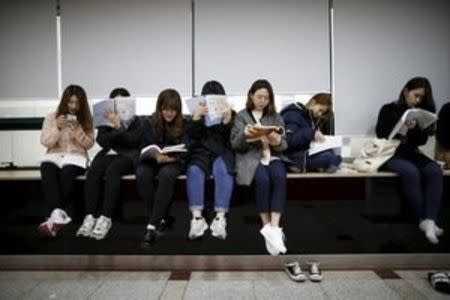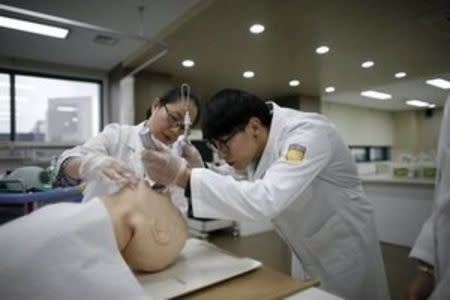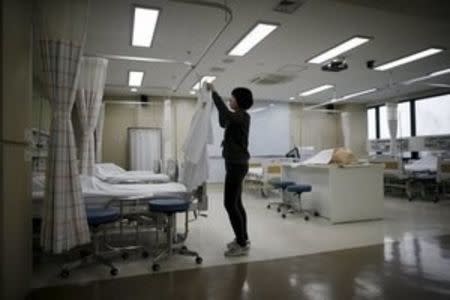Bleak job prospects drive South Korean youth to vocational schools
By Ju-min Park BUCHEON, South Korea (Reuters) - Living in a country obsessed with academic success, Jang Dong-hae did what every South Korean parent dreads when he dropped out of university a year into a finance degree, doubting whether it would get him a job with a top firm. Five years on, and midway through a nursing course at a community college, Jang's parents are happy and his employment prospects are good. "First when I told my parents, they asked me: "why would you quit the university that you are in now and restart?"", Jang said at the campus in Bucheon, on the outskirts of Seoul. "Since the employment rate is much higher than other majors, my parents support me and really like it." Their priorities will have been influenced by South Korea's unemployment rate. In February more than 11 percent of those aged between 15 and 29 years were jobless - the highest level since the late 1990s. By October it had come down to 7.4 percent but was still more than double the overall unemployment rate. Jang, who pays his nursing tuition with money earned from part-time jobs, has joined a growing number of young South Koreans who are foregoing a more prestigious university education in favor of either vocational training or seeking work straight from school. On Thursday, South Korea won't shut down but it will be running late, as final year high school students sit annual entrance exams for universities and colleges. Families will pray for their children's success. The stock market will open an hour late, to help reduce traffic congestion so that students reach examination halls on time. And for 35 minutes, there will no commercial airline flights landing or taking-off, so that noise is reduced during the English aural section of the exam. These are all demonstrate South Korea's single-minded approach to education, and the stress that goes with it. Yet, somewhat surprisingly for a nation where parents have something of a "Tiger Mom" reputation, the number of high school graduates that go on to tertiary education has fallen from 77 percent in 2008 to 70.8 percent this year. That is still higher than the average for the developed nations in the Organization for Economic Cooperation and Development (OECD). But, with a sluggish economy and a rigid job market that makes it hard to get on a career track, high entrance exam scores don't carry the same promise of future success that they once did. "Parents' ambition to send their kids to good universities has peaked and is slowly declining," said Son Jong-chil, economics professor at Hankuk University of Foreign Studies in Seoul. "Little by little people are now thinking that not everyone should go to universities." LESS CRAMMING, MORE CARING The “Youth Hope Fund” recently launched by President Park Geun-hye is a sign of the hard times faced by young South Koreans. The fund aims to help create jobs for them with support from the private sector, and last month Samsung Group and Hyundai Motor Group executives donated a combined 45 billion Korean won ($39 million). Unable to find jobs, an increasing number of university graduates and dropouts, like Jang, are entering mostly two- and three-year vocational schools to gain qualifications in nursing, physical therapy, social welfare and early childhood education. "Employment conditions are pretty tough and young people are seeking a job that is connected to their major, not irrelevant, so that is why many people are choosing nursing," You So-young, a nursing professor at Bucheon University. Care-givers are in high demand due in part to South Korea's ageing population, and Bucheon University, which despite the name is categorized as a junior college, says it has an 88 percent job placement rate for nursing graduates. During the past three years the number of university graduates who have gained admission to vocational school has risen by 25 percent to 1,379, according to the Korean Council of University College Education. It is a miniscule percentage of the total number of students entering universities and colleges - 356,000 and 214,000 respectively - but still reveals some change in the mind-set among the youth. More would make the switch if they could. About 40 holders of bachelor degrees have applied for five places set aside for them next semester in Bucheon's nursing program. "I think I've made a right decision," said Jang. ($1 = 1,154.4500 won) (Editing by Tony Munroe and Simon Cameron-Moore)





